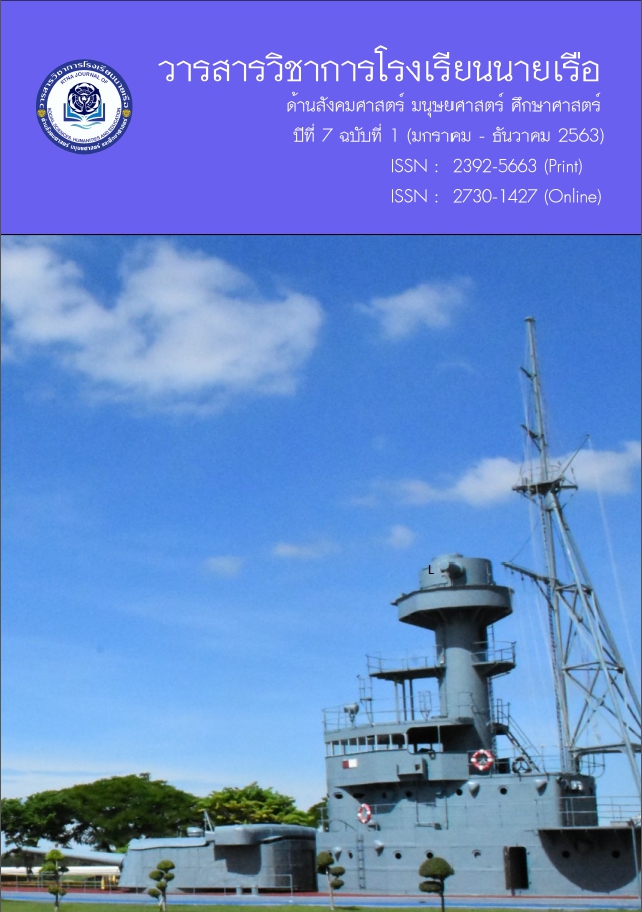การพัฒนาศักยภาพครูด้านการสร้างเครื่องมือวัดและประเมินผล เพื่อพัฒนาทักษะการคิด วิชาวิทยาศาสตร์ ชั้นประถมศึกษาปีที่ 6
คำสำคัญ:
ชุดฝึกอบรม, การพัฒนาศักยภาพครู, การสร้างเครื่องมือวัดและประเมินผลบทคัดย่อ
การวิจัยนี้มีวัตถุประสงค์เพื่อศึกษาการพัฒนาศักยภาพครูด้านการสร้างเครื่องมือวัดและประเมินผล เพื่อพัฒนาทักษะการคิดวิชาวิทยาศาสตร์ แบบแผนการวิจัยที่ใช้คือการทดลองแบบกลุ่มเดียว สอบก่อนและหลังศึกษาชุดฝึกอบรม กลุ่มตัวอย่างที่ใช้ในการวิจัยคือ ครูผู้สอนวิชาวิทยาศาสตร์ชั้นประถมศึกษาปีที่ 6 จำนวน 32 คน สำนักงานเขตพื้นที่การศึกษาประถมศึกษาสุราษฎร์ธานีเขต 2 เครื่องมือที่ใช้ในการวิจัย ได้แก่ ชุดฝึกอบรมแบบทดสอบเลือกตอบ จำนวน 20 ข้อ แบบประเมินศักยภาพครูด้านการการสร้างข้อสอบ และแบบประเมินความพึงพอใจต่อชุดฝึกอบรม เก็บข้อมูล และวิเคราะห์ข้อมูลโดยใช้สถิติพรรณนา ได้แก่ ค่าเฉลี่ยค่าร้อยละ ค่าส่วนเบี่ยงเบนมาตรฐาน ผลการวิจัยพบว่า คะแนนผลการทดสอบหลังการศึกษาชุดฝึกอบรมสูงกว่าคะแนนก่อนการศึกษาชุดฝึกอบรม (t = 17.03 df =31 sig = .00) อย่างมีนัยสำคัญทางสถิติที่ระดับ .05 ผู้เข้ารับการฝึกอบรมมีศักยภาพในการสร้างข้อสอบคิดเป็นร้อยละ 82.05 มีคุณภาพอยู่ในระดับดี และผู้เข้ารับการอบรมมีความพึงพอใจต่อการศึกษาชุดฝึกอบรมเฉลี่ยเท่ากับ 4.42 อยู่ในระดับมาก
เอกสารอ้างอิง
ฉลอง ชูยิ้ม. (2556). การพัฒนารูปแบบการพัฒนาครูในการสร้างข้อสอบ (วิทยานิพนธ์ปริญญาดุษฎีบัณฑิต). กรุงเทพฯ: มหาวิทยาลัยราชภัฏพิบูลสงคราม.
ชมพูนุท เมฆเมืองทอง. (2554). การพัฒนารูปแบบฝึกอบรมการสร้างแบบทดสอบมาตรฐานวิชาชีพ. วารสารมหาวิทยาลัยราชภัฏมหาสารคาม, 5(2), 117- 130.
ชุติมา สัจจานันท์, บุญศรี พรหมมาพันธุ์, และอลิสา วานิชดี. (2552). รายงานการวิจัยเรื่องการพัฒนาชุดฝึกอบรมเพื่อพัฒนาสมรรถนะบรรณารักษ์ห้องสมุดประชาชน. วิจัยสมาคมห้องสมุดแห่งประเทศไทย, 3(1), 1–12.
ชุมศรี ไพบูลย์กุลกร.(2549). การพัฒนาชุดฝึกอบรมครูเรื่องการจัดกระบวนการเรียนรู้แบบบูรณาการ (วิทยานิพนธ์ปริญญามหาบัณฑิต). กรุงเทพฯ: มหาวิทยาลัยราชภัฎพระนคร.
ธีรศักดิ์ อุบลรัตน์. (2544). การพัฒนาชุดฝึกอบรมด้วยตนเองเรื่องการจัดทำผลงานทางวิชาการของข้าราชการ (วิทยานิพนธ์ปริญญามหาบัณฑิต). กรุงเทพฯ: มหาวิทยาลัยศรีนครินทรวิโรฒ.
นลินี ตรีสุวรรณ์. (2543). การพัฒนาเครื่องมือสำหรับสร้างแบบทดสอบโดยสร้างข้อสอบจากเทคนิคฟอร์มข้อสอบ (ปริญญาวิทยาศาสตรมหาบัณฑิต). กรุงเทพฯ: จุฬาลงกรณ์มหาวิทยาลัย.
นุชจิรา แดงวันสี. (2562). รายงานการนิเทศการศึกษา ระยะที่ 1. สุราษฎร์ธานี: สำนักงานเขตพื้นที่การศึกษาสุราษฎร์ธานี เขต 2.
พรเพ็ญ ฤทธิลัน. (2554). การสรางแบบทดสอบวัดผลสัมฤทธิ์ทางการเรียน. สืบค้น 10 มกราคม 2563, จาก
http://pornpenrit.blogspot.com/2011/06/blog-post.html.
พิชิต ฤทธิ์จรูญ. (2552). หลักการวัดและประเมินผลการศึกษา. (พิมพ์ครั้งที่ 5). กรุงเทพฯ: เฮาว์ ออฟ เคอร์ มิสท์.
พินดา วราสุนันท์. (2554). การพัฒนาศักยภาพทางการประเมินในด้านการสร้างข้อสอบครูประถมศึกษา
โดยใช้เครือข่ายมิตรวิพากษ์ (วิทยานิพนธ์ปริญญาดุษฎีบัณฑิต). กรุงเทพฯ: จุฬาลงกรณ์มหาวิทยาลัย.
เย็นใจ สุวานิช. (2551). รายงานการวิจัยเรื่องการสร้างชุดฝึกอบรมการเรียนการสอนคณิตศาสตร์ ตาม
หลักสูตรการศึกษาขั้นพื้นฐาน พุทธศักราช 2551 (ปริญญาวิทยาศาสตรมหาบัณฑิต). พระนครศรีอยุธยา: มหาวิทยาลัยราชภัฎพระนครศรีอยธุยา.
ล้วน สายยศ, และอังคณา สายยศ. (2538). เทคนิคการวิจัยเพื่อการศึกษา. (พิมพ์ครั้งที่ 5). กรุงเทพฯ: สุวีริยาสาส์น.
ล้วน สายยศ และอังคณา สายยศ. (2543). เทคนิคการวัดผลและการเรียนรู้. (พิมพ์ครั้งที่ 2). กรุงเทพฯ: สุวีริยาสาสน์.
สมเกียรติ เหล่าประเสริฐ. (2546). การพัฒนาพนักงานครูเทศบาลด้านการสร้างข้อแบบเลือกตอบสังกัด
เทศบาลเมืองเลย (วิทยานิพนธ์ปริญญามหาบัณฑิต). มหาสารคาม: มหาวิทยาลัยมหาสารคาม.
สำนักทดสอบทางการศึกษา. (2561). หลักสูตรการพัฒนาศักยภาพการสร้างเครื่องมือวัดผลสัมฤทธิ์ทางการเรียนแบบอัตนัย (ฉบับปรับปรุง 2561). กรุงเทพฯ: สำนักงานคณะกรรมการการศึกษาขั้นพื้นฐาน กระทรวงศึกษาธิการ.
สิริรัตน์ พวงยอด. (2555). การพัฒนาศักยภาพครูด้านการสร้างข้อสอบวัดทักษะกระบวนการทางคณิตศาสตร์ (วิทยานิพนธ์ปริญญามหาบัณฑิต). เชียงใหม่: มหาวิทยาลัยเชียงใหม่.
อรรถพร กิ่งบุญ. (2548). การพัฒนาระบบคลังข้อสอบสำหรับอินเทอร์เน็ตและ GPRS (วิทยานิพนธ์ปริญญามหาบัณฑิต). อุบลราชธานี: มหาวิทยาลัยอุบลราชธานี.
Anderson, L.W., & Krathwohl D. (2001). A taxonomy for learning, teaching and assessing : a revision of bloom’s taxonomy of educational objectives. New York: Longman.
Bloom, B.S. (1976). Human Characteristics and School Learning. New York: McGraw-Hill.
Foulger, T.S. (2009). An unexpected discovery about the critical friend in action research Inquiries. Action Research, 1(1), 1 - 18.
Vo, L.T., & Nguyen, H.T.M. (2010). Critical friends group for EFL teacher professional development . ELT Journal, 64(2), 205-213.
ดาวน์โหลด
เผยแพร่แล้ว
ฉบับ
ประเภทบทความ
สัญญาอนุญาต
เนื้อหาและข้อมูลในบทความที่ลงตีพิมพ์ในวารสารวิชาการโรงเรียนนายเรือ ด้านสังคมศาสตร์ มนุษยศาสตร์ และ ศึกษาศาสตร์ ถือเป็นข้อคิดเห็นและความรับผิดชอบของผู้เขียนบทความโดยตรง ซึ่งกองบรรณาธิการวารสาร ไม่จำเป็นต้องเห็นด้วย หรือร่วมรับผิดชอบใด ๆ
บทความ ข้อมูล เนื้อหา รูปภาพ ฯลฯ ที่ได้รับการตีพิมพ์ในวารสารวิชาการโรงเรียนนายเรือ ด้านสังคมศาสตร์ มนุษยศาสตร์ และ ศึกษาศาสตร์ ถือเป็นลิขสิทธิ์ของโรงเรียนนายเรือ หากบุคคลหรือหน่วยงานใดต้องการนำทั้งหมดหรือส่วนหนึ่งส่วนใดไปเผยแพร่ต่อหรือเพื่อกระทำการใด ๆ จะต้องได้รับอนุญาตเป็นลายลักษณ์อักษร จากโรงเรียนนายเรือก่อนเท่านั้น






